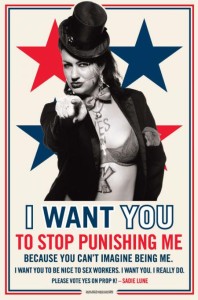 My post about the repulsive anti-sex worker aspects of the Pastafarian Canon stimulated a lot of conversation on Facebook, a lot of it disappointingly clueless. When confronted with the criticisms, a lot of FSM fans just shrugged and pulled out the infamous “It’s just satire” defense. That kinda pisses me off; not only because it’s dismissive of my point, or because it’s intellectually lazy, but it also shows a fundamental misunderstanding of what satire is, and why it’s such a vital tool in speaking truth to power.
My post about the repulsive anti-sex worker aspects of the Pastafarian Canon stimulated a lot of conversation on Facebook, a lot of it disappointingly clueless. When confronted with the criticisms, a lot of FSM fans just shrugged and pulled out the infamous “It’s just satire” defense. That kinda pisses me off; not only because it’s dismissive of my point, or because it’s intellectually lazy, but it also shows a fundamental misunderstanding of what satire is, and why it’s such a vital tool in speaking truth to power.
Sophie Hirschfeld has written a better reply to those complaints than I ever could. The chief difference between us here is that she’s a sex worker; I’m not. Her skin is quite literally on the line in this issue. When I write about sex workers or whorephobia, it’s because I have friends in sex work whom I want to support and help, but in the end, I’m not the one at risk. Because Sophie has to think about these things every day, she’s able to take some of the points that I was trying to make and talk about them with a clarity and eloquence that I can’t. These paragraphs are vital to understanding why the stripper factories are a problem, and not just a bunch of uptight assholes trying to ruin everyone’s fun:
The thing that these people are missing is that this part of the “satire” isn’t satire. It is a horrible commentary on how society views sex workers.If you’re unsure about that, you only need to change the category of the subject to see it. What if the strippers were simply “naked women?” What if the strippers were (to the point of discomfort) “young women?” The problem becomes clear when you change the category of woman. The reason people see the term “strippers” as acceptable is because they are sexualized a certain way. That, itself, is not a problem, but in the context of saying they are from a factory, then they are not only sexual, but their sexuality being an element of entertainment for the patron of heaven, in this case, also makes them the “other.” Instead of being voluntarily sexualized, as most strippers are, these are a depiction of strippers being otherized. Our society accepts the discrimination because that’s discrimination of the other. It is a joke on strippers because we already see strippers as a joke, in our culture.
The same problem goes for the negligence of the pseudo-religion to recognize people of varying genders, sexes and sexual preferences. The act of making male strippers invisible to to heterosexual men is the exact same act that our society is used to doing. It is dehumanizing to them. As with changing the category to examine why the claim about strippers is problematic, changing the context of hiding male strippers can show us the very flaw in this kind of thinking, within the parody. You may accept that the FSM lore says that male strippers are invisible, because some people don’t want to be reminded that homosexuals exist, but would you still accept it if the lore said that black female strippers were hidden from racists, because they don’t want to be reminded of their existence? The reality is, black female strippers exist. Male strippers exist. Sexuality is diverse and using already existent social tropes in order to uphold your parody only reinforces those biases. It isn’t parody.
Read the whole thing, especially if you think my essay or Kate Donovan’s original piece was completely missing the point. Listen to someone who lives this stuff, then speak.

About Chris Hall
A somewhat nerdy pervert who looks (mostly) normal on the outside, Chris Hall is fascinated by the politics, culture, and art of sex. He has written for The Atlantic, Alternet, SF Weekly, Slixa, numerous anthologies, and a dog blog that will go discreetly unnamed here.


Leave a Reply